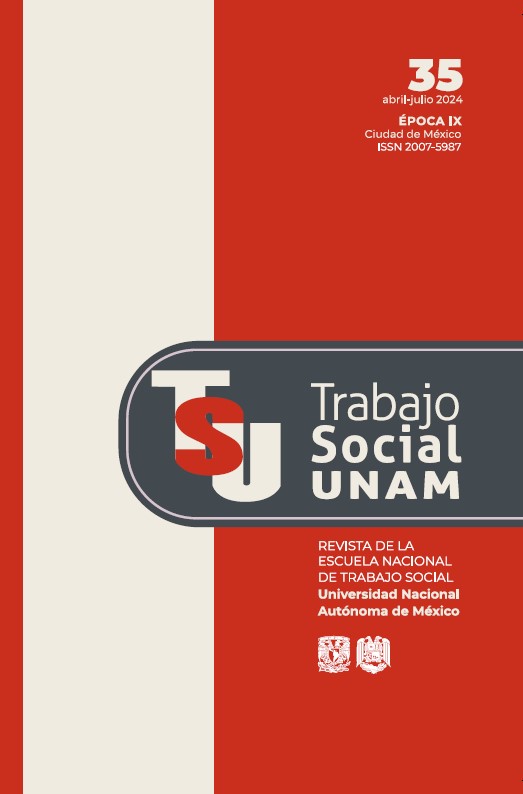La ficción como categoría para aproximarnos al quehacer del trabajo social
Main Article Content
Abstract
The academic community’s contribution to the social work profession is manifested in the recovery, enunciation, and analysis of every day practices. This work, conducted as part of a master’s thesis in Social Work at UNAM, distances itself from imposing a “should be” of the profession and bases its methodology on the categories of fiction and invention to account for what is produced, displaced, and invented in the daily lives of social work professionals working in high schools in Mexico City. As a result, it analyzes working conditions, interactions with other educational actors, and the tactics and strategies employed by social workers in schools. The relationship between academic discourse, the norms of the Ministry of Public Education, and common practices is questioned, seeking to understand how social workers invent and reinvent their work. The fieldwork focused on in-depth interviews with colleagues, leading to understand the following categories in the findings: colleagues’ positions as subjects in their school communities, the displacement of their daily practices in the face of institutional conditions and personal stances, the shifts and movements in their discourses, the sense of doing social work in the hagiographic and mystical, and finally, the use of tactics and strategies to invent their daily work. The text also addresses the discourses and perceptions of social workers about the social reality of youth, including topics such as violence, drugs, and exclusion. It highlights the strategies used by social workers to address conflictive situations and support students, as well as tensions between institutional norms and everyday practices. Finally, it acknowledges that in the fiction of school social work, not only the everyday is reflected, but also the possibility of intervention and change for our profession.
Article Details
Citas en Dimensions Service
References
Referencias bibliográficas
Castañeda, F. (1994). La sociología mexicana: la construcción de su discurso. En A. Andrade, La sociología contemporánea.
FCPyS UNAM.
Certeau, M. d. (1993). La escritura de la historia. Universidad Iberoamericana, Departamento de Historia.
Certeau, M. d. (1995). Historia y Psicoanálisis Entre Ciencia y Ficción (Universidad Iberoamericana (México),
Ed.). Universidad lberoamericana. Certeau, M. d. (1996). La invención de lo cotidiano: artes de hacer. I (A.
Pescador, Trans.). Universidad Iberoamericana.
Certeau, M. d. (2006). La fábula mística: Siglos XVI-XVII (L. Colell Aparicio, Trans.). Siruela.
Corrosa, N., López, E., & Monticelli, J. M. (2006). El trabajo social en el área educativa: desafíos y perspectivas.
Espacio.
Diario Oficial de la Federación. (2024, 04 01). Ley General de Educación. https://www.diputados.gob.mx/Leyes-
Biblio/ref/lge.htm
Foucault, M. (2022). El orden del discurso (A. González Troyano, Trans.). Austral.
González Casanova, P. (2004). Las nuevas ciencias y las humanidades: de la academia a la política. Anthropos.
Miranda Aranda, M. (2004). De la caridad a la ciencia I. Espacio.
Moro, J. (2000). Problemas de agenda y problemas de investigación. En C. Escolar, Topografías de la investigación.
Métodos, espacios y prácticas profesionales. Eudeba.
Orozco, B. (2004). La conceptualización de tecnologías del yo, historia de un encuentro con Foucault para pensar
lo educativo. en M. Gómez. Espacios imaginarios y sujetos de la educación en la transición epoc. Plaza
y Valdés. Reguillo, R. (2017). Los jóvenes en México. FCE - Fondo de Cultura Económica.
Secretaría de Educación Pública. (1981). Manual de organización de la Escuela de Educación Secundaria.
Secretaría de Educación Pública, Autoridad educativa federal para la Ciudad de México. (2011). Marco para la
convivencia escolar en las escuelas de educación secundaria en la ciudad de México. https://www.aefcm.
gob.mx/normateca/disposiciones_normativas/DGOSE/archivos-2023/2023-08-22/marco-para-la-convivencia-
escolar-secundaria-ciudad- mexico.pdf
Tello, N. (2013, diciembre). La violencia escolar como forma de convivencia en una sociedad. Trabajo social, VII
época (4).
Tello, N. (2014). Trabajo social escolar. Construcción de mejores ambientes escolares.
Tello, N. (2018). La violencia escolar, algo más que golpes e insultos entre buenos y malos: Un acercamiento
desde lo social. https://neliatello.com/docs/La-violencia-escolar-algo-mas-que-golpes-e- insulto-entre-
buenos-y-malos.pdf
Tello, N. (2020). El cambio en trabajo social: intención, rupturas y estrategias. https://neliatello.com/docs/
el-cambio-en-trabajo-social-intencion-rupturas-y- estrategias.pdf
Tenti Fanfani, E. (1993). La escuela vacía. Lozada.
Zemelman, H. (2011). Horizontes de la razón. Uso crítico de la teoría. Anthropos.
